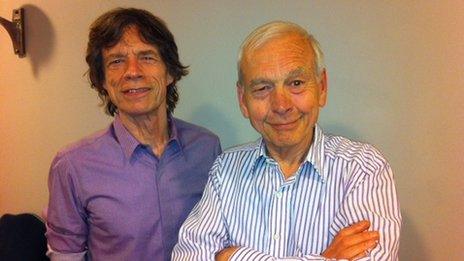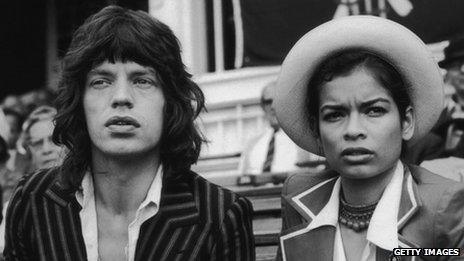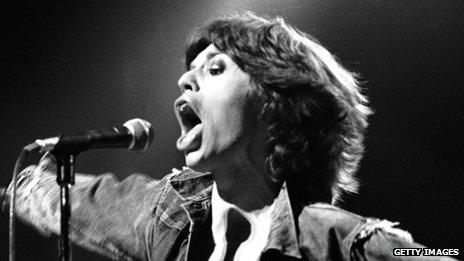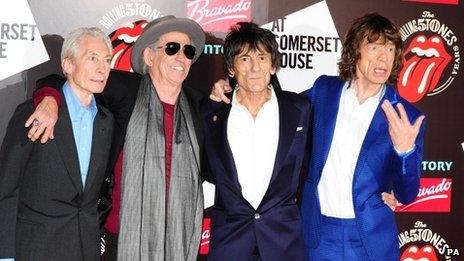Jagger: 'I thought of being a journalist once'
- Published

John Humphrys will be at Glastonbury to see the Stones on Saturday night
The Rolling Stones are one of the headline acts at this weekend's Glastonbury Festival. Lead singer Mick Jagger, who is 70 next month, was in London this week and subjected himself to a grilling by BBC Radio 4's Today programme presenter John Humphrys, who is also 70 this year.
John Humphrys: "Can I call you Mick?"
Mick Jagger: "Please do, John."
JH: "The first concert I ever saw you in was Madison Square Gardens."
MJ: "Right. What year?"
JH: "In 1972."
MJ: "OK right. Exile on Main Street Tour."
JH: "That's it. You've got it and I was completely blown away along with about 10,000 other people who were there, or 50,000 or whatever it was, vast audience, and the next time I'm going to see you is in Glastonbury on Saturday night."
When Humphrys met Jagger: Full interview
MJ: "Right. Bit of a gap."
JH: "Bit of a gap. Can't be the same concert can it?"
MJ: "Probably quite a few of the same numbers."
JH: "Well will it be?"
MJ: "I dunno. I can't tell you the set list and I don't know the '72 Madison Square Gardens set list off the top of my head."
JH: "Well I remember the greats obviously, I remember the big ones. You'll do the golden oldies won't you?"
MJ: "I'm not saying what we're doing at Glastonbury. I can't tell you the set list for Glastonbury."
JH: "All right. Is it a big secret?"
MJ: "Well, it's nice to have a bit of a surprise but people usually nick the set list somehow so it goes out on an email somewhere and someone takes a picture of it or something like that."
JH: "Well they would be a bit disappointed if, well, I would be a bit disappointed if you didn't do some."
MJ: "What's your favourite?"
JH: "Well you've got to do Satisfaction."
MJ: "What's your playlist? I'm gonna pick your brain."
JH: "So long as it's Satisfaction or Brown Sugar I can live with that."
MH: "OK so we'll put those in the notebook and when I put my pins in the numbers I'll…"

Jagger, with his then wife Bianca in 1972, when John Humphrys last saw the Stones
JAGGER ON ROCK AND ROLL
JH: "I appreciate that. Look, how much has rock 'n' roll changed? I know that's an enormous question but from the day you started 50 years ago and then it was, it was about rebellion really wasn't it?"
MJ: "Well I can go back before that, I mean, you know. I was doing rock 'n' roll before the Rolling Stones started and you know we were talking about this the other night. It's rather interesting the whole beginning of it, this ephemeral thing that was, um, people thought was a dance fad and it was going to disappear overnight, and so the longevity saw us starting in the middle '50s and so on, or even before, it depends where you want to put it, and so having this really long history.
"I mean still a lot of it (is) still three chords. You know you go back to the first writers in rock 'n' roll like Buddy Holly and all these people, Chuck Berry, quite clever, very clever lyric writers, quite clever musical writers.
"It sounded very unsophisticated, a lot of it was blues but a lot of it was 12 bars and a lot of it was blues-based or country blues-based so now a lot of that's still in it so it hasn't, I mean if you took all of that out it wouldn't be the same musical form so it sort of defines itself so in a lot of ways rock 'n' roll music is still the same musical form as it always has been.
"Obviously the sounds have changed, the beats have changed. The thing about music is that beats change a lot so you can have the same song but you can play it with a different beat people don't recognise so beats have changed a lot but a lot of the beats are still straight eight beats. New bands tend to play with a lot of straight eight beats but the influence of all other polyrhythmic music such as African music, hip hop style, has changed the basic sort of four-four structure somewhat but there's got to be more similarities than dissimilarities."

Mick Jagger performing at the Empire Pool in Wembley in 1973
JAGGER ON THE ROLLING STONES
JH: "But it was your demeanour wasn't it? It was the way you came on stage and..."
MJ: "Well it depends on how you carry yourself when you're doing it but it's not only what you do, it's the way you do it."
JH: "Yeah. Exactly."
MJ: "If you're menacing when you're doing it then you can smile…"
JH: "That's the word. You were menacing."
MJ: "Part of the Rolling Stones, not only when we started out but throughout, some of it is menacing but you're not menacing for two hours, you're menacing for 10 minutes and then you're smiling and romantic and so you're not.
"We wrote and had hits with songs like As Tears Go By, it wasn't particularly menacing. And there were many other songs. We had songs like Angie which were plain love songs. The whole thing about the Rolling Stones is that they're not just one thing, they're not just in one box. The Rolling Stones would pride themselves in the fact that they can do one kind of thing, and turn their hand to something else perhaps, maybe some with more success than others but we like to try our hand at lots of different things."
JH: "And how much longer can you go on doing that?"
MJ: "I've no idea. It's a bit like asking how long you're gonna broadcast the Today show for?"
JH: "Well, I'll tell you the honest answer in my case, it's as long as they'll have me."
MJ: "Well, probably I'll give you the same answer."
JAGGER ON ALTERNATIVE CAREERS
JH: "You're a rock icon, whether you like it or not. And you have been for a long time and that's been your life. Is there a moment when you say to yourself, God I wish I'd done something else?
"I wish in a way I'd had more control of my life because I imagine doing what you've done, although it's just about everyone's dream, it's left you with very few choices, the path of your life has been decided for you, I mean you set out to do it."
MJ: "You decide."
JH: "But you're not in control are you?"
MJ: "You are very much in control."
JH: "Are you?"
MJ: "Absolutely. You're in control and do what you want, work when you want, it's very um, in that way you're in control of your own destiny. I mean do you wish that you'd done something else, I'm sure that everyone wishes they'd have done, could have tried to have been a, you know, I'd have been a dancer if anything, yeah but so many injuries."
JH: "How about a school teacher, you mentioned it?"
MJ: "Well a school teacher would have been very gratifying I'm sure, you know, there're millions of things that you would have loved to have done, a politician, a journalist, I thought of being a journalist once."
JH: "Did you?"
MJ: "Yeah, and so all these things that you think of when you're a teenager you could think, well I would have liked to have done that, but that's completely pointless. I don't feel frustrated for lack of control at all and I'm very pleased with what I've done.
"Obviously you would have liked to have done, everyone wants to have done more things in their lives. But it's a slightly intellectually, undemanding being a rock singer but you know you make the best of it."

Mick Jagger and John Humphrys both turn 70 this year
JAGGER ON THE X-FACTOR
JH: "Would you have gone on X-Factor? Do you approve of X-Factor?"
MJ: "I don't approve or disapprove of it."
JH: "In the sense that this is what they all do now. Do you think that's good for music?"
MJ: "Is X-Factor good for music? It's just one part of, I think X-Factor is over-estimated, there's many many people who come through music that don't come through X-Factor and you know, pop music's always been a very, very odd thing, where people come through somehow from one way or another and X-Factor is just one thing and I'm sure it won't last forever. There's always been talent competitions ever since I can remember so I hold nothing particularly against the X-Factor."
JH: "So you don't say to your kids, my son, don't be a rock star?"
MJ: "I don't tell them things like that."
JH: "But you've enjoyed it?"
MJ: "Yeah."
JH: "And you're not going to tell me how much longer you're going to go on?"
MJ: "No."
JH: "I won't ask that question ever again. Sir Mick Jagger, thank you very much."

The Stones are one of the three headline act at Glastonbury this year
- Published29 June 2013
- Published29 June 2013
- Published28 March 2013
- Published30 May 2013
- Published16 June 2013